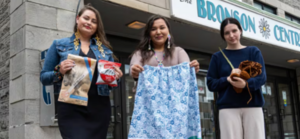IQ Story 5
Revision as of 05:16, 29 November 2024 by PreetDhillon13 (talk | contribs)
A Future of Revitalized Language and Culture with Digital Technologies
I am Abe Okpik an 87-year-old Elder of the Iqaluit community, I have witnessed a profound transformation in our ways of being, our traditions, and how we teach and learn. Not long ago, I feared that our language the heart of our identity was slipping away following the assimilation attempts of residential schools. I can recall the sterile concrete walls, the 24feet-by-24feet classrooms with all the desks lined neatly, and the warning on the chalkboard saying ENGLISH ONLY! Anyways, those days are gone, now, I see children fluent in both Inuktitut and English, thanks to an immersive language curriculum and hands-on cultural programs. These aren’t just concrete classrooms like my days; they’re living spaces where our youth weave baskets, chant songs, and learn sacred dances while being guided by their teachers and elders.
Technology has its role here too, particularly virtual reality (VR). Although I was hesitant to adopt VR at first, I later saw how it could bridge the gap between the physical and digital realms, it has allowed a piqued interest from youth to experience ceremonies, rituals, and heritage events as if they were physically present, regardless of geographical barriers. We were starting to notice more youth gravitating towards digital Western games and they were less inclined to attend cultural events and ceremonies but, ever since the new computer science teacher at the school introduced VR it offered the concept of blending digital technologies with authenticity access for cultural preservation. With advancements like haptic feedback and AI-driven avatars, VR experiences are becoming increasingly realistic and engaging. The new multimodal media avenues have not only brought together our youth and culture but are true calls to action for undoing some of the injustices of the residential school system.
Economic Growth and Prosperity
Our economic landscape has changed dramatically over the last few decades. Where once we depended solely on external supply chains, we now are self-sufficient. Small businesses rooted in traditional crafts and modern innovations thrive with the emergence of fintech startups from students who have been educated by the Nakasuk School, pursued higher education and returned with their knowledge to grow the local digital trade economy. When these students return, they open sustainable enterprises, mentor younger generations, and create technologies that honour the land and water. This has led to record-low unemployment rates in our community as a testament to the success of the educational model that Nakasuk utilizes. Our graduates are not just job seekers; they are creators, innovators, and contributors to a diversified economy. In the past, many of our graduates would pursue fishing, which is a contractionary trade due to competition from corporations, and those who left Iqaluit would settle in the cities that educated them, leading to a rapidly decreasing population. However, now, we are seeing our population begin to grow again with new, young families settling here, resulting in a growth in our real GDP per capita by 4%.
Another problem that plagued our community in the past was food security and price inflation given the harsh climate and limited growing seasons. Through hands-on learning initiatives from the Nakasuk curriculum encouraging students and researchers to collaborate on projects to develop climate-resilient greenhouses and vertical farming techniques motivated many of our youth to pursue agriculture-science education. This has ensured a consistent supply of fresh produce year-round while blending traditional food practices, like hunting and foraging, to create a supply chain that is impermeable to the weather. The economic benefit of this did not stop at supply chains but, also trickled down to reduced food inflation, especially concerning fresh produce prices. Our communities no longer rely heavily on costly imports due to high carbon taxes and supply chain delays. Hence, this has significantly reduced the financial burden on families and has made healthy, affordable food accessible to everyone in the community regardless of economic status. Many thanks to the Nakasuk School for revitalizing a sense of love for learning in our youth so they continue to pursue further education in comparison to the colonial history of educating our children for assimilation.

